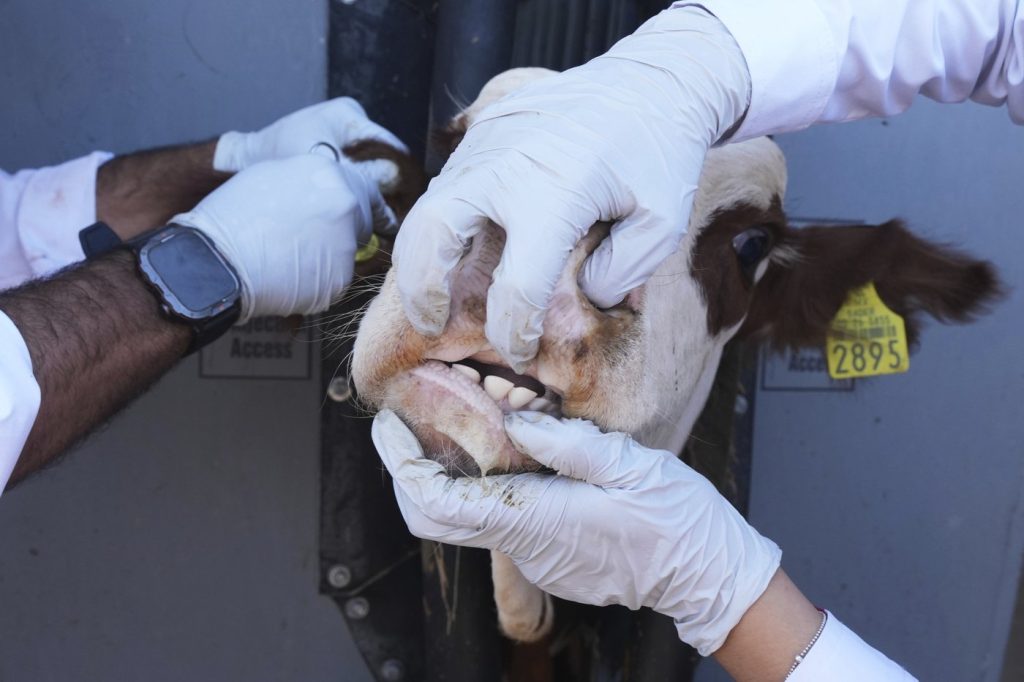HERMOSILLO, Mexico (AP) — The recent suspension of live cattle imports from Mexico by the United States has severely impacted ranchers like Martín Ibarra Vargas. After enduring two years of severe drought, Ibarra Vargas had hoped to recover financially by selling his calves across the border. His family has a long history of cattle ranching in Sonora, the northwestern Mexican state that shares a border with Arizona, but they are now grappling with the economic implications of this new crisis.
The U.S. Department of Agriculture implemented the cattle import ban in July, marking the third such suspension in eight months. The ban was enacted due to the concern over the New World Screwworm, a flesh-eating parasite that has been detected in southern Mexico and is advancing northward. The screwworm, known as the Cochliomyia hominivorax fly, can inflict severe damage on the tissues of warm-blooded animals, including livestock and humans, leading to potentially fatal lesions. This parasite poses a significant threat to livestock health and the overall economy.
U.S. agriculture officials described the screwworm as a "devastating pest," and they have initiated various measures to prevent its re-entry into the United States, where it had previously been eradicated. As part of their strategy, they plan to breed billions of sterile flies and release them in affected areas to disrupt the reproductive cycle of the screwworm population.
The ban also extends to horses and bison, impacting a ranching sector already weakened by drought. Last year, the cattle export business was a significant contributor to the Mexican economy, generating $1.2 billion. This year, however, Mexican ranchers have exported fewer than 200,000 head of cattle, which is less than half of their historical averages for this time frame.
Ibarra Vargas, recognized as a smaller rancher by local standards, is reconsidering his family's future without the ability to export calves to the U.S. In light of the repeated bans, he has diversified his operations into beekeeping, sheep farming, and cow's milk production. While this new direction provides some income, it falls significantly short of what he earned through live cattle exports. He refers to this period as "Tiempos de vacas flacas" or "times of lean cows," and remains concerned about sustaining his family ranch, which has been in operation for three generations.
Despite the adversity, ranchers in Sonora have been proactive. They have begun to seek new markets, notably selling over 35,000 mature cows within Mexico at a significant loss over the past two months. Juan Carlos Ochoa, the president of the Sonora Regional Cattle Union, reported that these sales occurred at a staggering 35% lower price compared to export values.
The U.S. first suspended cattle imports last November, and more than 2,258 cases of screwworm have since been confirmed in Mexico. The treatment of infected animals is labor-intensive, requiring the removal of maggots and extensive care for the healing of lesions along with anti-parasitic medication. Some ranchers have even taken to selling retail beef through upscale butcher shops known as "meat boutiques," but finding alternative markets, such as Japan, poses a different set of challenges and is not as straightforward as exporting directly to U.S. feedlots.
Ibarra Vargas faces an uncertain future. With his limited cattle stock and the burden of debt from the prolonged drought, he expresses deep concern that his children show little interest in maintaining the family business. As a rancher without a viable market or means to continue feeding his calves, he feels the pressure mounting. "We're running out of time," he laments, highlighting the precarious situation of the ranching community amid these multifaceted challenges.
In summary, the ongoing crisis for Mexican ranchers, exacerbated by the screwworm infestation and economic pressures from drought, is forcing traditional cattle farming families to adapt rapidly or face potential extinction of their operations.











